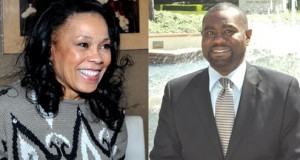
Claiming defamation, “false light” (a legal term, referring to unwanted, malicious publicity) and intentional infliction of emotional distress, former District 4 City Council candidate, Dwayne Crenshaw is suing his one-time rival, Councilwoman Myrtle Cole, who defeated Crenshaw by about 1,000 votes (or 10 percentage points) during last year’s hotly contested election.
“We have sadly come to accept that negative campaigning and the politics of personal destruction is part of the game,” Crenshaw was quoted as saying in a press release issued by his attorney, Travis Jang-Busby. “I get that. However, I believe we can do better. And, when the attacks are clearly based on outright lies, like in my case, we shouldn’t accept that. That’s why I have decided to take a stand.”
The civil suit, filed in Superior Court, Central Division last week, also names Cole’s political consultant, Larry Remer and his firm, The Primacy Group as co-defendants.
At issue are statements contained in a campaign mailer, statements that Crenshaw and his attorney claim were false, “… in that Crenshaw was never outside a crack house, never sought to buy illegal drugs, and never lied to police about involvement in criminal drug activity.”
According to the complaint, Remer told Voice of San Diego that the campaign mailer in question was simply repeating information contained in an article published in the San Diego State University Daily Aztec student newspaper about an incident in which Crenshaw called police for assistance because a friend had claimed he was being held against his will by drug dealers.
However, according to Crenshaw, the mailer twisted and editorialized the article to make him look like someone who was involved in illegal drugs.
Crenshaw claims the defendants in his suit, i.e., Cole and Remer, altered quotes contained in the Daily Aztec story, which dates back to 1992, and which were also used by Remer against Crenshaw in a 2002 City Council race, according to the complaint.
“Myrtle Cole and Larry Remer knew their defamatory statements were false and they published them anyway to injure my client and win an election,” Jang-Busby said. “Even during the course of a public campaign, the First Amendment doesn’t protect defamatory speech made with malice, especially when it alleges criminal activity.”
Cole’s office declined comment, saying only, “We have no comment as this arose out of a campaign issue.”
Click here to view Dwayne Crenshaw’s complaint in full; here to see the campaign ad; and here for the 1992 Daily Aztec article that was allegedly misquoted with malice.












The last time a looser in an otherwise fair election won in such a suit was——never.
It was an ugly campaign; but this is going nowhere.